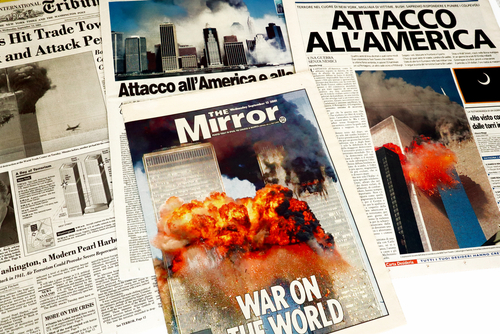
In a perplexing turn of events, Osama bin Laden’s 2002 ‘Letter to America’ has resurfaced and gone viral on TikTok, sparking debate and concern among various communities. The letter, which was penned by the notorious Al-Qaeda founder, attempts to justify the heinous acts of September 11, 2001, by accusing the United States of complicity in the oppression of Palestinians and the spread of AIDS globally.
The resurgence of this letter has been met with alarm by those who remember the tragic loss of nearly 3,000 innocent lives on that fateful day. The document is rife with anti-American, anti-Semitic, and anti-Western rhetoric, yet it has found an audience among Gen Z users on social media platforms who claim their “eyes have been opened” after reading it. This disturbing trend raises questions about the historical awareness and susceptibility to extremist propaganda among younger generations.
OBAMA & PASTOR ALWAYS CELEBRATED 9-11 & TREASON LIKE AL QAEDA & FAR LEFT DO NOW We warned you that Free Palestine was just a front group for Al Qaeda. Y’all laughed.
Now the unhinged Left say the quiet part out loud: Bin Laden in Letter to America was right and so was killing… pic.twitter.com/HIGN76W5AR
— Recall Katie Hobbs (@AmericanHubener) November 16, 2023
It is essential to contextualize bin Laden’s letter within his life as a jihadist, whose followers were responsible for the slaughter of thousands of Muslims and non-Muslims alike. His support for oppressive regimes and his vision for an America transformed into a religious state akin to Taliban-era Afghanistan should not be overlooked or romanticized.
The letter’s virality began with a TikTok user urging others to read the two-page manifesto, seemingly without understanding the full implications of bin Laden’s ideology. This has led to a dangerous glorification of a terrorist’s rationale, ignoring the freedoms and values that bin Laden sought to destroy.
I never thought that 22 years after 9/11, there would be a significant segment of young Americans justifying the murder of 3,00 people in the biggest terror attack in American history.
We're so screwed. pic.twitter.com/YccBh5MI4s
— Republicans against Trump (@RpsAgainstTrump) November 16, 2023
The fact that the letter has gained traction online after being linked to by a UK newspaper in an article about the Israel-Hamas conflict is troubling. The outlet later removed the link, stating it was being shared “without its original context,” but the damage had already been done as the letter continued to spread across social media platforms.
This incident highlights the power of social media to disseminate information without proper vetting or context, potentially leading to the normalization of extremist views. It is a stark reminder of the need for critical thinking and media literacy, especially when historical documents are repurposed to serve contemporary narratives.
Critics have pointed out that the letter blatantly ignores the atrocities committed by bin Laden and his followers, including the targeting of civilians in the name of jihad. The Saudi terrorist’s claims, such as AIDS being a “Satanic American Invention” and his anti-Semitic conspiracy theories, should be recognized as the delusions of a mass murderer, not as points for intellectual debate.
The response to the letter’s newfound popularity has been varied, with some public figures mocking the naivety of those who have been swayed by bin Laden’s words. It is a concerning development that a terrorist’s justification for murder could find any semblance of support in today’s society.
As we reflect on the impact of this viral phenomenon, it is imperative to reaffirm our commitment to truth and to honor the memory of those who lost their lives to terrorism. We must stand against the spread of misinformation and extremist ideologies, ensuring that the lessons of history are not forgotten or distorted for the sake of social media trends.
In conclusion, the viral spread of bin Laden’s ‘Letter to America’ serves as a cautionary tale about the dissemination of extremist content online. It underscores the importance of historical context and the dangers of endorsing the viewpoints of individuals who have caused immeasurable suffering. As a society, we must remain vigilant and educate future generations to recognize and reject the narratives of hate that seek to undermine our values and security.












